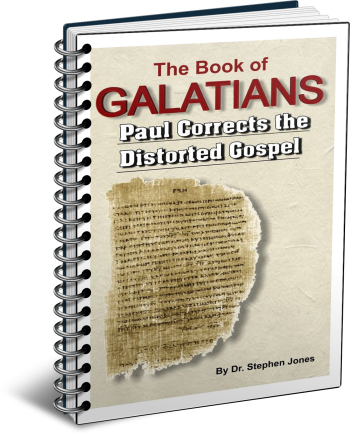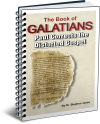Latest Posts
View the latest posts in an easy-to-read list format, with filtering options.

This is a verse-by-verse commentary on Paul's epistle to the Galatians, which was written to combat those Jewish Christians who were unable to leave the Old Covenant and adhere to the New Covenant. In their attempt to add the New Covenant to the Old, and to add Jesus to the temple system of animal sacrifices and other rituals, they had distorted the gospel.
Category - Bible Commentaries

After Paul shows us the distinction between Old Covenant slaves and New Covenant Sons, he concludes in Galatians 4:7-9,
7 Therefore, you are no longer a slave, but a son, and if a son, then an heir through God. 8 However, at that time, when you did not know God, you were slaves to those which by nature are no gods. 9 But now that you have come to know God, or rather to be known by God, how is it that you turn back again to the weak and worthless elemental things, to which you desire to be enslaved all over now?
A Son is never a slave as such, but while he is a minor he does not differ from a slave in that he is told what to do and must be obedient.
The Law expresses this relationship through the distinction between court-ordered slavery vs. voluntary slavery. The first is mandated, and he is a slave against his will. The second is voluntary, because after being set free, he is allowed to return to his master as a voluntary, permanent slave. Exodus 21:5, 6 says,
5 But if the slave plainly says, “I love my master, my wife, and my children; I will not go out as a free man,” 6 then his master shall bring him to God [elohim, “the judges”], then he shall bring him to the door or the doorpost. And his master shall pierce his ear with an awl; and he shall serve him permanently.
Biblical slavery is not the same as the oppressive slavery of man throughout history. Biblical slaves enjoyed human rights, and if he was abused, the law set him free (Ex. 21:26, 27). The slave owner who had faith in God and understood the mind of Christ would treat his slave well. So the Law of God sets forth the possibility that a freed slave may love his master and wish to remain as his slave permanently.
Biblical slavery was not a matter of kidnapping someone and selling them into slavery. Instead, it was done for debt payments. If a man stole from his neighbor and was caught, he had to pay at least double restitution. Ex. 22:3 says, “if he owns nothing, then he shall be sold for his theft.”
Even so, a slave had to be set free in the seventh year. But once he was set free, he could then return as a voluntary slave. The purpose of biblical slavery (in the mind of God) was to place sinners under the authority of godly believers who could teach them by personal example and by honest work how to live in a manner pleasing to God. Hence, when a sinner was reformed through love, he may never want to leave him. He then had the option of freedom or perpetual slavery.
If the freed slave chose to remain, he would be taken to the elohim, often translated “judges” or “rulers,” in order to make it official and to ensure that the man was not being forced to remain a slave. Then the master would take an awl and (briefly) attach his earlobe to the door of the house. Then, like a son, he became part of the household permanently.
This is the type of “bondservant of Jesus Christ” that Paul had become. Being set free from the slavery that the Law had imposed upon him for his debt to sin, Paul returned to his Master, desiring to be His bondservant.
Jesus taught this using different terms in John 15:14, 15,
14 You are My FRIENDS, if you do what I command you [not by compulsion, but because we are in agreement]. 15 No longer do I call you slaves, for the slave does not know what his master is doing, but I have called you friends, for all things that I have heard from My Father I have made known to you.
During their discipleship training, they were "slaves." At the end, they graduated to "friends." This new relationship involves revelation of the divine plan, which is not revealed to slaves but to friends. Slaves are obedient to the commands; friends participate in the decision-making. They understand the divine purpose because they hear His voice, learn the plan, and understand the mind of the Master.
Again, Jesus referenced this briefly in John 8:34 and 35,
34 Jesus answered them, “Truly, truly, I say to you, everyone who commits sin is the slave of sin. 35 And the slave does not remain in the house forever; the son does remain forever. 36 If therefore the Son shall make you free, you shall be free indeed.
While we were in sin, we were slaves of sin. But the law mandates that slaves be set free after six years. So “the slave does not remain in the house forever (i.e., indefinitely). The Son has set us free from the house of sin. He redeemed us to be His own slaves, but even that relationship comes to an end eventually. When the slave is set free, he then may return as a voluntary slave, indicating that he is in agreement with Jesus Christ. He wants to become part of the household of Christ.
This, essentially, transforms him from a slave to a son.
The first Pentecost was the day God came down upon Mount Sinai and spoke the Ten Commandments to the people. The people had just made their vow of obedience, making them God’s slaves. Because Acts 7:38 calls Israel “the church in the wilderness,” it was a type of the Church under Pentecost which began in Acts 2.
The difference is that the Israel Church had to live under greater bondage than the later Church. The prime difference is that slavery under the Old Covenant is greater than the slavery of the later Church. The Pentecostal Age itself has been our own time in the wilderness, being trained by the law until we enter the Promised Land. The inheritance comes through the fulfillment of the feast of Tabernacles, which correlates with our entry into the Promised Land as a complete body.
In Galatians 4:4, Paul seems to give the impression that when Christ came, all of us AS INDIVIDUALS suddenly became spiritually mature sons. That is not the case. Paul was speaking on a historical level, rather than an individual level. Historically, the age from Moses to Christ was an age of slavery, ending with the giving of the Holy Spirit, our inheritance. But individually, each person of each generation must undergo the same pattern.
When we as individuals are first redeemed, we are yet immature spiritually. Hence, for a time we need to be tutored as minors, and in such a condition we are still no better than slaves, even though we are heirs of the Abrahamic promise. So we are sent to the school of Moses to learn of His ways and to refine our understanding of sin and righteousness.
Yet we are called to grow up into Christ, so that we may function as sons, rather than as slaves. As we grow, we are entrusted more and more with responsibility (that is, our calling).
A slave is an heir of the Promise who does not yet walk in the light of the Feast of Tabernacles. He knows Passover, but he is currently still walking in Pentecost, learning obedience as a servant and putting on the mind of Christ so that he may use his inheritance properly upon receiving it.
Pentecost has given us the downpayment of the inheritance, that is, the Spirit (Eph. 1:14), but we have not yet received "all the fullness of God" (Eph. 3:19), which is the full inheritance. We will receive the full inheritance at the time of “the adoption as sons” (Gal. 4:5). The houiothesia was not an adoption of an orphan from another family, but rather the son-placing of a fully-mature son born within the family. It was the point when a father could trust his son to receive the authority of the inheritance, the father's estate. He then received power of attorney, and his signature was legally binding.
It is plain that our heavenly Father would not entrust the inheritance to a newborn babe, nor even to a five-year-old son, who might use the inheritance to buy a boat load of cake and candy—or a mansion and a Mercedes-Benz, as is usually done in today's world of successful evangelists. Those who receive their inheritances too soon, as with the Prodigal Son, always end up using the inheritance to coddle the flesh.
Mature Sons, who live by the Love Principle, are in full agreement with the will of God and the mind of Christ. Like Jesus Himself in His earthly life, they will do only the will of the Father. They can say, as Jesus did in John 8:28, “I do nothing on my own initiative.” Again, He says in verse 50, “I do not seek My glory.”
He was the great Amen of God (Rev. 3:14). He did nothing but what He saw His Father do. He said nothing except what He heard His Father say. This is our inheritance as well. We will know that we have inherited the fullness of God when we are fully and completely the Amen of God in all that we do or say.
The Promise to Abraham was the Holy Spirit. The Spirit works within our hearts to transform us into the Amen of God. Our time spent in the realm of Pentecost is the school of Moses, by which the law is written on our hearts until we are fully in the image of Christ. We are then suited to enter the “Promised Land” by means of the Feast of Tabernacles.